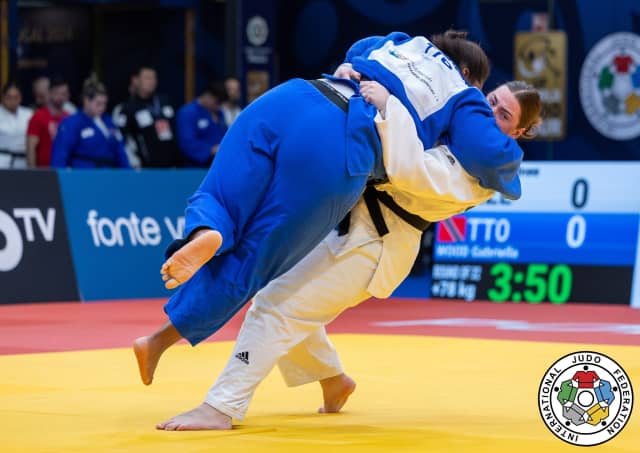Twenty-two year old Hilal Ozturk met Kim in the semi-final, obeying the rankings perfectly. Ozturk has become a much more mobile judoka in recent months and showed the benefit of that when she beat the Yonekawa (JPN) in her opening contest with both a well-timed throw and intelligent contest management.
On the other half of the draw it was the other Japanese entrant, Miki Mukunoki, unseeded, who came through, beating Ozturk’s compatriot, Austria’s Hoellwart and Hayme (FRA). Hayme was not happy with this result but regrouped well to win in the repechage and still deliver herself a final block contest. The number one seed, Kim, was her opposition after she lost to Ozturk in the semi-final.
Mukunoki won her semi-final against Asselah (ALG) who had defied the odds in pool D, dispatching Berlikash (KAZ) ahead of Urdaneta (VEN) and Andrews (NZL).
Andrews ended up settling for 7th place but she’s young and progressing and only a few months ago took her first World Judo Tour medal. She is looking for Olympic qualification for New Zealand and if she maintains her current trajectory, she might just succeed; she’s on target and in the green zone and it’s great to see for a country not always involved in the Olympic race too heavily.
Asselah and Wolszczak (POL) fought for the other bronze medal. It proved to be one of the fastest contests of the whole tournament with the Polish fighter whipping underneath Asselah with a perfectly placed maki-komi, rolling through the knees. Ten seconds were all that were needed to secure Woszczak’s bronze medal.
Hayme and Kim’s final block contest wasn’t quite so decisive. Kim’s very strong top left grip kept coming but it wasn’t linked to attacks well enough, giving space for both Hayme and the referee to intervene. Jimmy griooing was harder to overcome but it was Hayme’s attacks which looked more likely to score. As the time passed, each received two penalties.
However, Kim worked hard to get Hayme a third penalty at the edge, not a positive tactic but it was up to Hayme to battle back against it and stay more positive within the contest area. She did edge into the lead, just and eventually Kim dropped with a very poor attack, one with no real effort to throw and was therefore penalised a third time. Both competitors could learn from reviewing the contest as each had a plan that was achievable with only minor tweaks.
In the final Ozturk and Mukunoki faced off, having had only one previous meeting, with a Turkish victory in that occasion. Lots of movement kicked things off but without sincere gripping there was a penalty each in the first 25 seconds. In the next exchange Ozturk took the dominant grip and the Japanese judoka couldn’t withstand it and stepped out to earn a second penalty.
It was time for Mukunoki to step things up and she did just that. Her plan, with the size difference, was to never stop moving and ensure a number of well timed attacks avoiding risk of counters. It worked immediately and Ozturk had to drop to defend the movement, equalising the scoreline.
After two and a half minutes, a step in the wrong direction from blue gave Ozturk an entry and as a makikomi expert, she scored a waza-ari to put Mukunoki under a lot of pressure. Unfazed, Mukunoki came in with a very strong uchi-mata and then an osoto-gari on the bell but it wasn’t enough and the waza-ari came the deciding factor. Ozturk took gold in what turned out to be a high energy and interesting contest.
Final (+78 kg)
Bronze Medal Fights (+78 kg)











